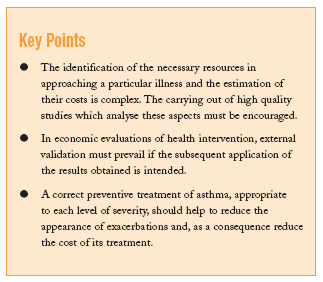The economic evaluation of medicines is increasingly being included in the taking of decisions by primary care doctors. The need to establish priorities in health spending, due to the progressive constraints on resources, has given rise to a greater number and diffusion of these studies all encompassed under the heading of pharmacoeconomy. For this reason, it is now inevitable that the term efficiency will be incorporated into medical language as the last link after efficacy and effectivity.1,2
Any economic evaluation requires the identification of the resources most relevant to the different options that are being compared and the estimation of the cost of each resource. The usual resources for obtaining this information come from the medical literature or in the carrying out of ad hoc studies. In any case, the better the quality of the information obtained, the more value the results will have.3
In the management of patients and attributing their costs can be very different between areas, comparable in principle, and also, depending on the analysis perspective which has been taken into account. Basically there are two ways of analysing these aspects in the context of normal clinical practice: retrospectively by access to databases and prospectively by means of observational clinical trials and studies. Both cases are not exempt from biases and possible confusion factors.3,4
Although the randomised clinical study may be the better method of analysing the efficacy of an intervention, in the economic evaluation it has great limitations, such as the lack of external validation of the results obtained on the use of resources, in many cases conditioned by the protocol of the study itself. The obtaining of data by observational studies allows data nearer to clinical practice to be obtained, but it has as a disadvantage, the lower level of quality of the data obtained. Lastly, a much used third option are decision analysis models which give rise to greater disadvantages than the two previous options by being based on suppositions and, particularly when they lack transparency, they are normally more questionable.5
Therefore, the identification of the resources employed in approaching an illness constitutes an important limitation in economic evaluation studies and this study contributes to supporting the data on the seriousness of asthmatic crises treated by primary care and its diagnostic and therapeutic management. The assigning of costs to each process also presents with difficulties, although minor, since there are resources more or less agreed by consensus in our country, although they may not be official.3
Without a doubt it is of interest to carry out evaluations on the management of illnesses in the primary care environment and on the costs attributed to them, but we should move forward to a global evaluation, taking into account the interaction between primary care and specialised care, to obtain data from a wider health perspective.
Lastly, despite the limitations of the study, some data are pointed out which shows the economic impact that can be attributed to the cost of ineffectiveness in the approach to an illness. An incorrect maintenance treatment in an asthmatic patient can give rise to a more serious crisis and as a consequence higher costs for the health system.









